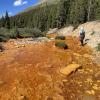News Headlines
- A new exhibit devoted to water issues recently opened at the Alamosa Public Library and focuses on place-based education and storytelling to bring together multi-generational audiences.
 Ripples in space and time constantly churn through the universe, forming what's called the "gravitational wave background." A new study examines why these waves are so much bigger than scientists once predicted.
Ripples in space and time constantly churn through the universe, forming what's called the "gravitational wave background." A new study examines why these waves are so much bigger than scientists once predicted. CU researchers have created shape-shifting microparticles that change their shape in response to environmental factors for self-directed propulsion and navigation.
CU researchers have created shape-shifting microparticles that change their shape in response to environmental factors for self-directed propulsion and navigation. In an ongoing effort to bridge a pervasive investment gap in innovation funding, CU Boulder has awarded pre-seed funding to Illumen Therapeutics, developing cancer treatments based on discoveries from startup co-founder Roy Parker's lab at CU Boulder.
In an ongoing effort to bridge a pervasive investment gap in innovation funding, CU Boulder has awarded pre-seed funding to Illumen Therapeutics, developing cancer treatments based on discoveries from startup co-founder Roy Parker's lab at CU Boulder. CU Boulder researchers have developed a laser-based imaging method called stimulated Raman scattering to improve the performance of desalination plants by allowing real-time detection of membrane fouling. The advance could help make desalination more efficient and reliable as global demand for clean water rises.
CU Boulder researchers have developed a laser-based imaging method called stimulated Raman scattering to improve the performance of desalination plants by allowing real-time detection of membrane fouling. The advance could help make desalination more efficient and reliable as global demand for clean water rises. Winter jackets may seem simple, but sophisticated engineering allows them to keep body heat in and let sweat out. Read from CU experts Longji Cui and Wan Xiong on The Conversation.
Winter jackets may seem simple, but sophisticated engineering allows them to keep body heat in and let sweat out. Read from CU experts Longji Cui and Wan Xiong on The Conversation. The 20th anniversary of the annual report tracks how sea ice, snow cover and other vital signs of the Arctic have changed, and the impact that's having on people and wildlife. Read from CU experts Matthew Druckenmiller and Twila Moon on The Conversation.
The 20th anniversary of the annual report tracks how sea ice, snow cover and other vital signs of the Arctic have changed, and the impact that's having on people and wildlife. Read from CU experts Matthew Druckenmiller and Twila Moon on The Conversation. CU Boulder scientist Roselinde Kaiser and research colleagues seek to understand the connection between executive functioning and mood problems.
CU Boulder scientist Roselinde Kaiser and research colleagues seek to understand the connection between executive functioning and mood problems. Diane McKnight and Tom Marchitto are collaborators on a new project looking for a way to extract rare earth metals from contaminated Colorado streams. The goal is to improve water quality while also increasing the domestic supply of raw materials for advanced technologies.
Diane McKnight and Tom Marchitto are collaborators on a new project looking for a way to extract rare earth metals from contaminated Colorado streams. The goal is to improve water quality while also increasing the domestic supply of raw materials for advanced technologies. Calvin and Hobbes, Bill Watterson's beloved comic strip, ended three decades ago this month, yet its magic endures, says William Kuskin, CU Boulder English professor and expert on comics and graphic novels.
Calvin and Hobbes, Bill Watterson's beloved comic strip, ended three decades ago this month, yet its magic endures, says William Kuskin, CU Boulder English professor and expert on comics and graphic novels.


